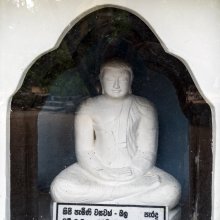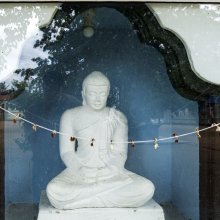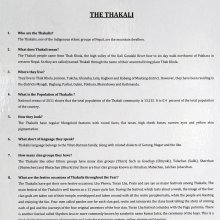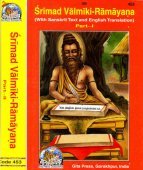Mama: 18 definitions
Introduction:
Mama means something in Buddhism, Pali, Hinduism, Sanskrit, Marathi, Jainism, Prakrit, Hindi, Tamil. If you want to know the exact meaning, history, etymology or English translation of this term then check out the descriptions on this page. Add your comment or reference to a book if you want to contribute to this summary article.
Images (photo gallery)
In Buddhism
Mahayana (major branch of Buddhism)
Source: academia.edu: A Study and Translation of the GaganagañjaparipṛcchāMama (मम) refers to the “ego”, according to the Gaganagañjaparipṛcchā: the eighth chapter of the Mahāsaṃnipāta (a collection of Mahāyāna Buddhist Sūtras).—Accordingly as The Lord said: “Śāriputra, the Tathāgata Ekaratnavyūha, seating in the lion’s throne thus, explained the dharma-seal called Gaganapariśuddhi to these Bodhisattvas, which has thirty-two aspects of entrance. What is this Dharma-seal (dharmamudrā) called Gaganapariśuddhi which has thirty-two aspects of entrance? [...] 19) all dharmas are non-originated from the beginning since they are beyond what belongs to the ego and appropriation (amamāparigraha); 20) all dharmas are beyond what belongs to the ego (mama) and appropriation (parigraha) because they have no owner (asvāmika); [...]”.

Mahayana (महायान, mahāyāna) is a major branch of Buddhism focusing on the path of a Bodhisattva (spiritual aspirants/ enlightened beings). Extant literature is vast and primarely composed in the Sanskrit language. There are many sūtras of which some of the earliest are the various Prajñāpāramitā sūtras.
Languages of India and abroad
Pali-English dictionary
Source: Sutta: The Pali Text Society's Pali-English DictionaryMama, Gen. Dat. of pers. pron. ahaṃ (q. v.) used quasi independently (as substitute for our “self-”) in phrase mama-y-idaṃ Sn. 806 thought of “this is mine, ” cp. S. I, 14, i.e. egoism, belief in a real personal entity, explained at Nd1 124 by maññanā conceit, illusion. Also in var. phrases with kṛ in form mamaṃ°, viz. mamaṅkāra etc.—As adj. “self-like, selfish” only neg. amama unselfish Sn. 220 (=mamatta-virahita SnA 276); Pv IV. 134 (=mamaṅkāra-virahita PvA. 230); J. IV, 372; VI, 259. See also amama, cp. māmaka. (Page 523)

Pali is the language of the Tipiṭaka, which is the sacred canon of Theravāda Buddhism and contains much of the Buddha’s speech. Closeley related to Sanskrit, both languages are used interchangeably between religions.
Marathi-English dictionary
Source: DDSA: The Molesworth Marathi and English Dictionarymama (मम).—ind A word (opposed to papa) used by cartmen and ploughmen in directing the lefthand-bullock.
--- OR ---
mama (मम).—(S) Mine; the sixth case in Sanskrit gram- mar of asmad. It occurs frequently in poetry. Ex. tyā kṣēma asō mama varā || asēṃ bōlē cintāturā ||. mama mhaṇaṇēṃ To say It is mine; to cry Ego, or say Yes. 2 To confess or own: also to consent or agree to.
--- OR ---
māma (माम).—m (Imit.) A term amongst children for the mother's breast; also n for the daily meal.
--- OR ---
māmā (मामा).—m (māmaka S) A maternal uncle. 2 A respectful compellation for the father of one's wife; also for a male person in general. Pr. kāmāpuratā māmā My dear friend--as long as I want your service. 3 A term of abuse for a person unlettered and unversed in business. 4 A facetious name at night for a rat. (Use at night of the plain name is held to be unlucky.)
Source: DDSA: The Aryabhusan school dictionary, Marathi-Englishmama (मम).—pro Mine.
--- OR ---
māmā (मामा).—m A maternal uncle. A respectful compellation for the father of one's wife.
Marathi is an Indo-European language having over 70 million native speakers people in (predominantly) Maharashtra India. Marathi, like many other Indo-Aryan languages, evolved from early forms of Prakrit, which itself is a subset of Sanskrit, one of the most ancient languages of the world.
Sanskrit dictionary
Source: DDSA: The practical Sanskrit-English dictionaryMama (मम).—(Gen. sing. of asmād the first personal pronoun) My, mine.
--- OR ---
Māma (माम).—a. (-mī f.)
1) My, mine.
2) Dear friend.
3) Uncle (used in voc.).
Source: Cologne Digital Sanskrit Dictionaries: Edgerton Buddhist Hybrid Sanskrit DictionaryMama (मम).—[ and mamama, nt., read amama, q.v.]
Source: Cologne Digital Sanskrit Dictionaries: Shabda-Sagara Sanskrit-English DictionaryMama (मम).—Ind. The genitive singular of the first personal pronoun.
Source: Cologne Digital Sanskrit Dictionaries: Benfey Sanskrit-English DictionaryMāma (माम).—i. e. mama, gen. sing. of asmad, + a, adj. Mine, [Pañcatantra] 98, 13; dear, 50, 12; 16; 51, 13; 23; 52, 4, etc.
Source: Cologne Digital Sanskrit Dictionaries: Cappeller Sanskrit-English DictionaryMāma (माम).—[masculine] only [vocative] in confidential address = uncle.
Source: Cologne Digital Sanskrit Dictionaries: Monier-Williams Sanskrit-English Dictionary1) Mama (मम):—[genitive case] sg. of 1st [person] [pronoun] in [compound]
2) Māma (माम):—m. ([from] mama [literally], ‘belonging to mine’) dear friend, uncle (only in [vocative case] sg. as a term of affection among animals in fables), [Pañcatantra] (cf. tāta, mātula etc.)
Source: DDSA: Paia-sadda-mahannavo; a comprehensive Prakrit Hindi dictionary (S)Mamā (ममा) in the Sanskrit language is related to the Prakrit word: Mamā.
[Sanskrit to German]
Sanskrit, also spelled संस्कृतम् (saṃskṛtam), is an ancient language of India commonly seen as the grandmother of the Indo-European language family (even English!). Closely allied with Prakrit and Pali, Sanskrit is more exhaustive in both grammar and terms and has the most extensive collection of literature in the world, greatly surpassing its sister-languages Greek and Latin.
Hindi dictionary
Source: DDSA: A practical Hindi-English dictionaryMāmā (मामा):—(nm) maternal uncle; also [māmūṃ] (generally used by Muslims); ~[mī] maternal aunt.
...
Prakrit-English dictionary
Source: DDSA: Paia-sadda-mahannavo; a comprehensive Prakrit Hindi dictionaryMamā (ममा) in the Prakrit language is related to the Sanskrit word: Mamā.
Prakrit is an ancient language closely associated with both Pali and Sanskrit. Jain literature is often composed in this language or sub-dialects, such as the Agamas and their commentaries which are written in Ardhamagadhi and Maharashtri Prakrit. The earliest extant texts can be dated to as early as the 4th century BCE although core portions might be older.
Kannada-English dictionary
Source: Alar: Kannada-English corpusMama (ಮಮ):—[pronoun] that or those belonging to me.
--- OR ---
Mama (ಮಮ):—[noun] a term used to mean 'this has my concurrence', 'I agree to this', etc.
--- OR ---
Māma (ಮಾಮ):—
1) [noun] a brother of one’s mother; a maternal uncle.
2) [noun] the father of one’s wife or husband; father-in-law.
Kannada is a Dravidian language (as opposed to the Indo-European language family) mainly spoken in the southwestern region of India.
Tamil dictionary
Source: DDSA: University of Madras: Tamil LexiconMama (மம) adjectival < mama. Mine; என்னு டைய. மமவிநாயகன் [ennu daiya. mamavinayagan] (திருப்புகழ் [thiruppugazh] 16).
--- OR ---
Mama (மம) noun (யாழ்ப்பாணத்து மானிப்பாயகராதி [yazhppanathu manippayagarathi])
1. cf. mā. Luck; அதிட்டம். [athittam.]
2. Water; நீர். [nir.]
--- OR ---
Māmā (மாமா) noun < மாமன். [maman.] [Telugu: māma, K. māva.] See மாமன் [maman], 1, 2, 3.
Tamil is an ancient language of India from the Dravidian family spoken by roughly 250 million people mainly in southern India and Sri Lanka.
Nepali dictionary
Source: unoes: Nepali-English Dictionary1) Mama (मम):—pron. my; mine;
2) Mama (मम):—n. 1. momo; 2. greed; avarice;
3) Māma (माम):—n.(baby talk) → भात [bhāta]
4) Māmā (मामा):—n. mother's brother;
Nepali is the primary language of the Nepalese people counting almost 20 million native speakers. The country of Nepal is situated in the Himalaya mountain range to the north of India.
See also (Relevant definitions)
Starts with (+104): Ma-maruttunulor, Mama kasse, Mama piripri, Mama-ghara, Mamaca, Mamaccaya, Mamacelo, Mamachemeloi, Mamadi, Mamaga, Mamagam, Mamai, Mamaiya, Mamajaka, Mamaji, Mamaji-re-topi, Mamajjaka, Mamajjakah, Mamak, Mamaka.
Ends with (+28): Adhiniyamama, Aidusmama, Amama, Anubalabbhamama, Apina mama, Camdamama, Camdumama, Cantamama, Chemama, Ciko mama, Culatamama, Damama, Dhamama, Epembeyabamama, Gamvamama, Gul-i-hamama, Hamama, Hammama, Imama, Itamama.
Full-text (+685): Mamata, Nirmama, Amama, Mamaka, Mamakritya, Mamakesara, Mamakara, Mami, Mamayati, Mamakina, Mamateya, Mamasatya, Mamatva, Mamattatta, Ahammamata, Mamam, Mamebahina, Mamapatala, Mamankarana, Kamapurata-mama.
Relevant text
Search found 134 books and stories containing Mama, Maamaa, Māma, Māmā, Mamā, Mamaa; (plurals include: Mamas, Maamaas, Māmas, Māmās, Mamās, Mamaas). You can also click to the full overview containing English textual excerpts. Below are direct links for the most relevant articles:
Rig Veda (translation and commentary) (by H. H. Wilson)
Chaitanya Bhagavata (by Bhumipati Dāsa)
Verse 1.12.117-118 < [Chapter 12 - The Lord’s Wandering Throughout Navadvīpa]
Introduction to chapter 12 < [Chapter 12 - The Lord’s Wandering Throughout Navadvīpa]
Verse 2.10.23-024 < [Chapter 10 - Conclusion of the Lord’s Mahā-prakāśa Pastimes]
Hanuman Nataka (critical study) (by Nurima Yeasmin)
Hanuman-Nāṭaka, Act 14 (Summary) < [Chapter 3]
Hanuman-Nāṭaka, Act 12 (Summary) < [Chapter 3]
9.1. The character of Rāma < [Chapter 4]
Taittiriya Upanishad Bhashya Vartika (by R. Balasubramanian)
Verse 2.462 < [Book 2 - Brahmavallī]
Significance of the Moon in Ancient Civilizations (by Radhakrishnan. P)
5. Mind in Jyotisha < [Chapter 7 - Moon the Significant Planet of Mind]
Apadana commentary (Atthakatha) (by U Lu Pe Win)
Commentary on the Biography of the thera Ekatthambhika < [Chapter 2 - Sīhāsaniyavagga (lion-throne section)]
Commentary on the biography of the the thera Sāriputta < [Chapter 1 - Buddhavagga (Buddha section)]
Commentary on the Biography of the thera Sumaṅgala < [Chapter 2 - Sīhāsaniyavagga (lion-throne section)]
Related products



